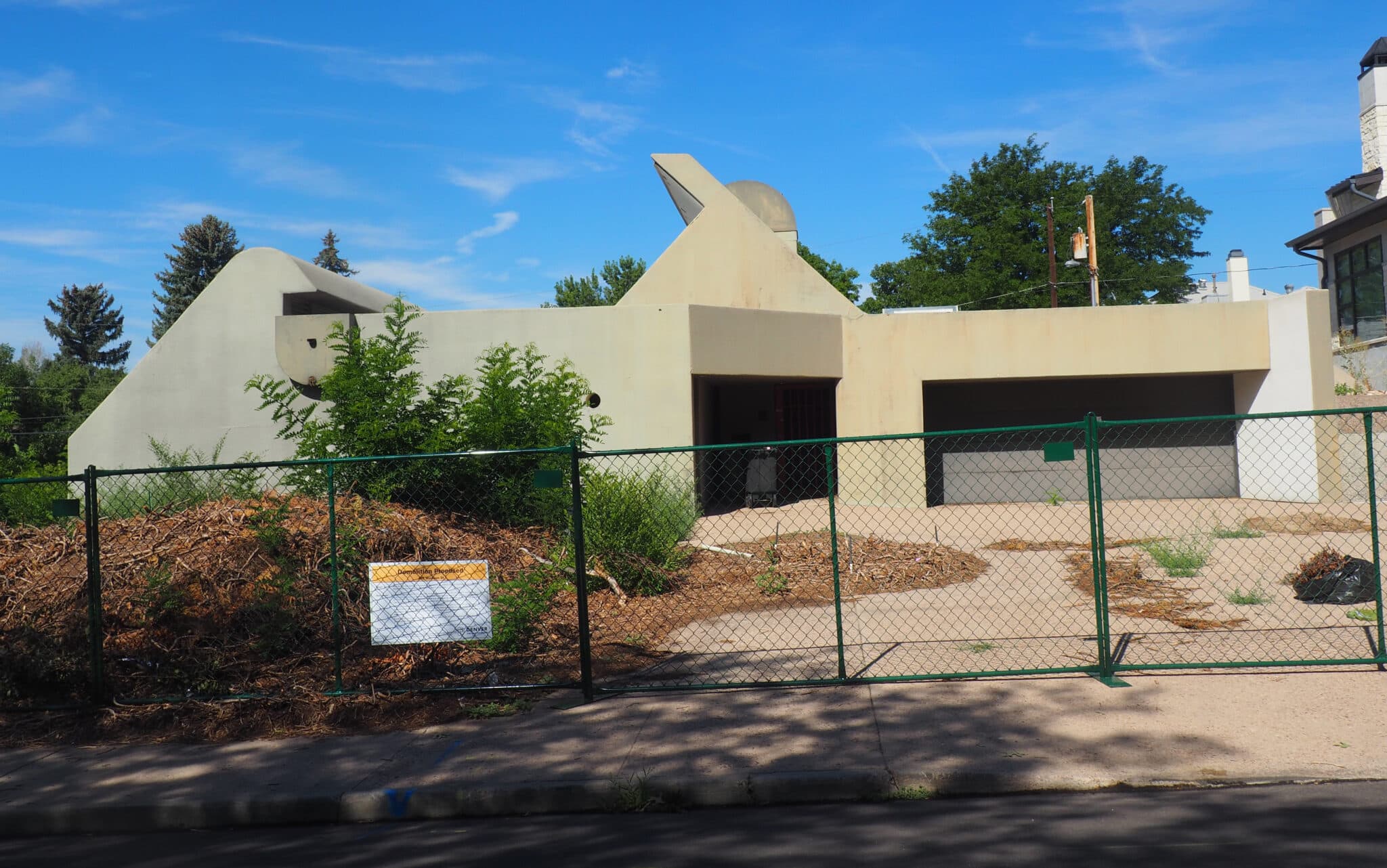
The new owner of the home at 401 N. Madison St. in Cherry Creek is a homebuilder that plans to demolish the home and construct two duplexes on the lot. (BusinessDen file photo)
The homebuilder that wants to tear down a late architect’s home in Cherry Creek says he is “disappointed” in efforts to preserve the building and expressed doubt that anyone would want to live there even if a million dollars or more were spent to fix it up.
Still, MAG Builders Chief Financial Officer Michael Moylen told BusinessDen Tuesday the company is open to selling architect’s Richard Crowther’s former home at 401 N. Madison to someone who would keep it standing.
But he said the company wants to at least break even. MAG paid $4 million for the property in May and has incurred costs since then.
“It might be $300,000 or $400,000 more,” Moylen said of a potentially acceptable sale price.
Crowther, who was known for his energy-conserving architecture, designed and built the home, completing it in 1979. He died in 2006 at age 96. Crowther designed Cooper Cinerama movie theaters, both in Denver and elsewhere, as well as buildings for King Soopers and the Joslins department store chain.
MAG wants to demolish the home and build a pair of duplexes on its 0.29-acre lot. The company applied for a demolition permit this summer. That prompted three Denver residents — Tom Hart, Alan Gass and Michael Hughes — to submit a landmark designation application for the home in late September. Such a designation would effectively prevent demolition.
Hart and Gass are architects, and Hughes owns a home in the Hilltop neighborhood designed by Crowther.
“This is an early earth shelter,” Hart said in an interview last week. “This is an early attempt at net-zero.”
Hart said his priority is seeing the building preserved, not necessarily named a landmark. To that end, he’s been reaching out to folks he thinks might want to buy the structure from MAG.
“But as you can imagine it’s difficult, especially with the economy looking the way it is,” Hart said.
Hart estimated that a buyer would need to put in “a million and a quarter, a million and a half” into renovations.
“One would need to go in and pretty much gut it and redo it, but also bring it up to code,” he said.
Asked separately, Moylen initially estimated $850,000 to $1.2 million, before realizing he wasn’t accounting for the cost of removing the indoor pool. He said he wasn’t sure what the point of renovations would be.
“What’s the function of this house if it’s landmarked?” he said. “Who’s going to live in it? Who’s going to rent it?”

Richard Crowther was known for his energy-conserving architecture. (Photo courtesy of Denver Public Library/Rocky Mountain News)
Moylen said the structure is a “personal preference house” built by someone who “did not care about resale at all.” There are low ceilings, narrow stairs and a small kitchen.
“Maybe they didn’t cook,” Moylen said.
“People are looking for a four-car garage for that price point, a much larger kitchen,” he added. “It’s hard to describe the bedroom layout.”
Hart, meanwhile, said a buyer might not necessarily fix up the house to live in it, although certain uses could need additional city approvals.
“Could you run a business out of there, or a foundation?” he said. “We’re trying to brainstorm all of that.”
Moylen said some neighbors in the area “have wanted this torn down for the past decade,” but that “everyone’s hoping for a resolution.” He said he’s reached out to possible buyers himself.
“Nobody has pulled the trigger,” he said. “That has to tell you something.”
Assuming an alternate resolution is not found, the application will on Nov. 1 go before Denver’s Landmark Preservation Commission, which will decide whether to forward it to the City Council for a vote.
“If it has to go to (the) council, that’s where we’ll take it,” Moylen said.

The new owner of the home at 401 N. Madison St. in Cherry Creek is a homebuilder that plans to demolish the home and construct two duplexes on the lot. (BusinessDen file photo)
The homebuilder that wants to tear down a late architect’s home in Cherry Creek says he is “disappointed” in efforts to preserve the building and expressed doubt that anyone would want to live there even if a million dollars or more were spent to fix it up.
Still, MAG Builders Chief Financial Officer Michael Moylen told BusinessDen Tuesday the company is open to selling architect’s Richard Crowther’s former home at 401 N. Madison to someone who would keep it standing.
But he said the company wants to at least break even. MAG paid $4 million for the property in May and has incurred costs since then.
“It might be $300,000 or $400,000 more,” Moylen said of a potentially acceptable sale price.
Crowther, who was known for his energy-conserving architecture, designed and built the home, completing it in 1979. He died in 2006 at age 96. Crowther designed Cooper Cinerama movie theaters, both in Denver and elsewhere, as well as buildings for King Soopers and the Joslins department store chain.
MAG wants to demolish the home and build a pair of duplexes on its 0.29-acre lot. The company applied for a demolition permit this summer. That prompted three Denver residents — Tom Hart, Alan Gass and Michael Hughes — to submit a landmark designation application for the home in late September. Such a designation would effectively prevent demolition.
Hart and Gass are architects, and Hughes owns a home in the Hilltop neighborhood designed by Crowther.
“This is an early earth shelter,” Hart said in an interview last week. “This is an early attempt at net-zero.”
Hart said his priority is seeing the building preserved, not necessarily named a landmark. To that end, he’s been reaching out to folks he thinks might want to buy the structure from MAG.
“But as you can imagine it’s difficult, especially with the economy looking the way it is,” Hart said.
Hart estimated that a buyer would need to put in “a million and a quarter, a million and a half” into renovations.
“One would need to go in and pretty much gut it and redo it, but also bring it up to code,” he said.
Asked separately, Moylen initially estimated $850,000 to $1.2 million, before realizing he wasn’t accounting for the cost of removing the indoor pool. He said he wasn’t sure what the point of renovations would be.
“What’s the function of this house if it’s landmarked?” he said. “Who’s going to live in it? Who’s going to rent it?”

Richard Crowther was known for his energy-conserving architecture. (Photo courtesy of Denver Public Library/Rocky Mountain News)
Moylen said the structure is a “personal preference house” built by someone who “did not care about resale at all.” There are low ceilings, narrow stairs and a small kitchen.
“Maybe they didn’t cook,” Moylen said.
“People are looking for a four-car garage for that price point, a much larger kitchen,” he added. “It’s hard to describe the bedroom layout.”
Hart, meanwhile, said a buyer might not necessarily fix up the house to live in it, although certain uses could need additional city approvals.
“Could you run a business out of there, or a foundation?” he said. “We’re trying to brainstorm all of that.”
Moylen said some neighbors in the area “have wanted this torn down for the past decade,” but that “everyone’s hoping for a resolution.” He said he’s reached out to possible buyers himself.
“Nobody has pulled the trigger,” he said. “That has to tell you something.”
Assuming an alternate resolution is not found, the application will on Nov. 1 go before Denver’s Landmark Preservation Commission, which will decide whether to forward it to the City Council for a vote.
“If it has to go to (the) council, that’s where we’ll take it,” Moylen said.


